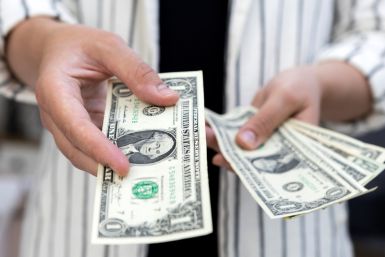Thailand will gradually raise interest rates to bring inflation back to target and ensure a continued recovery, the central bank chief said on Thursday, playing down the impact of a weak baht on the overall economy.
If you are feeling the effects of inflation, here is a news flash: Your kid is, too.
Pressure on Indonesia's rupiah is expected to be temporary, a senior Bank Indonesia (BI) official said on Thursday, predicting the currency would strengthen to reflect its fundamental value later in the year.
South Korea's exports likely grew at the slowest pace in nearly two years in September, hurt by a weakening global economy led by China, a Reuters survey showed on Thursday.
In the weeks before heading to San Francisco for their vacation this month, Jeff Skipper and his wife Valerie, from the United Kingdom, watched helplessly as the U.S.
Japan will consider more steps to cushion the blow of rising electricity bills, a government spokesperson said on Thursday, underscoring the pressure it faces in addressing the burden on households of higher prices for imports from a weak yen.
Sterling fell on Thursday and the U.S. dollar was clawing back a recent dip as relief at the Bank of England's intervention in bond markets faded in the face of nagging doubts about Britain's economic management and the outlook for global growth.
A new monthly measure of Australian consumer prices on Thursday showed annual inflation eased slightly in August from July thanks to a steep drop in petrol prices, offering hope cost of living pressures might be close to a peak.
The European Commission has warned EU countries that a broad cap on gas prices could be complex to launch and pose risks to energy security, amid calls from countries for Brussels to step in to tame high fuel prices.
Lebanon plans to slash its official exchange rate, replacing the 1,507 per dollar rate adopted 25 years ago with a rate of 15,000 in a step towards unifying numerous exchange rates, the finance minister told Reuters on Wednesday.
Mario Draghi's outgoing Italian government on Wednesday slashed next year's economic growth forecast to 0.6% due to sky-high energy costs but said strong revenues would still ensure an improvement in public finances.
The wild swings seen in British markets provided an "opportunity of a lifetime" to trade currencies and bonds, hedge funds and traders said on Wednesday.
Borrowing costs for UK companies have soared since the British government's mini-budget last week spooked markets, with data showing sterling corporate bonds suffering their biggest monthly selloff since at least the 1990s.
The U.S. trade deficit in goods narrowed for a fifth straight month in August amid a decline in imports, which is being driven by slowing domestic demand as the Federal Reserve aggressively tightens monetary policy to tame inflation.
The Bank of Canada on Wednesday said it would begin publishing a summary of its monetary policy deliberations starting next year, accepting a key recommendation from a transparency review by the International Monetary Fund.
The lack of clear progress on inflation means the Federal Reserve needs "moderately restrictive" interest rates that should reach a level between 4.25% and 4.50% by the end of this year, Atlanta Fed President Raphael Bostic said on Wednesday.
Russia estimates the new cut-off price for its budget rule that diverts excess oil revenues into its wealth fund at $62-$63 per barrel and may resume foreign currency purchases as early as this year, Finance Minister Anton Siluanov said on Wednesday.
The Bank of England stepped into Britain's bond market on Wednesday to stem a market rout, pledging to buy 65 billion pounds ($69.4 billion) of long-dated gilts after a government fiscal statement triggered the biggest sell-off in decades.
European Union countries were at odds on Wednesday over whether to cap gas prices in the bloc, with France, Belgium and 13 other states stepping up their call for the move opposed by Germany and others.
U.S. stock index futures fell on Wednesday led by Apple after it dropped plans to boost production of its new iPhones, but a pullback in benchmark Treasury yields from multi-year highs limited the decline.
China may tweak a proposed sharp increase in refined fuel export quotas for this year by extending the plan into next year, as it weighs the benefits to the economy of higher exports against low domestic stocks and operational challenges, four sources told Reuters.
In the month since Federal Reserve Chair Jerome Powell laid down a hard line on inflation, stocks have suffered double-digit losses, chasms have opened in global currency markets, and yields on the safest U.S.
British government 30-year bond yields hit a 20-year high on Wednesday, pushing past 5%, and bond strategists warned that markets were becoming close to untradeable due to volatility, something the Bank of England will be watching with alarm.
European shares slid 1% on Wednesday, in line with a sell-off in Asian markets, as an intensifying energy crisis in the region and the relentless surge in global bond yields fuelled worries about a recession.
Capital outflows are a "temporary phenomenon" and Taiwan, with its foreign currency reserves, has enough capacity to maintain its financial markets stable, Finance Minister Su Jain-rong said on Wednesday.
Thailand's central bank raised its key interest rate modestly for a second straight meeting on Wednesday to tame 14-year high inflation and ensure a continued economic recovery, while maintaining its 2022 growth projection of 3.3%.
The European Central Bank must continue to raise interest rates quickly to tame inflation and could reach a level that no longer stimulates the economy before Christmas, Finnish central bank chief Olli Rehn said in an interview.
Anonymous shared a plethora of tips and tricks on how to connect to blocked services, connect to DNS servers, how to stay anonymous, among others, to help Iranians.
The International Monetary Fund (IMF) and ratings agency Moody's criticised Britain's new economic strategy, as investors braced for more havoc in bond markets that has already forced the Bank of England to promise "significant" action.
Perhaps remarkably, some of the world's major economies still hold at least part of their rainy-day savings in sterling and British government bonds - raising questions about whether long instability in both will keep them doing so.



















































